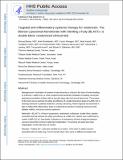Targeted anti-inflammatory systemic therapy for restenosis: The Biorest Liposomal Alendronate with Stenting sTudy (BLAST)—a double blind, randomized clinical trial
Author(s)
Banai, Shmuel; Finkelstein, Ariel; Almagor, Yaron; Assali, Abid; Hasin, Yonathan; Rosenschein, Uri; Apruzzese, Patricia; Lansky, Alexandra J.; Kume, Teruyoshi; Edelman, Elazer R.; ... Show more Show less
DownloadEdelman_Targeted anti.pdf (340.1Kb)
PUBLISHER_CC
Publisher with Creative Commons License
Creative Commons Attribution
Terms of use
Metadata
Show full item recordAbstract
Background
Activation of systemic innate immunity is critical in the chain of events leading to restenosis. LABR-312 is a novel compound that transiently modulates circulating monocytes, reducing accumulation of these cells at vascular injury sites and around stent struts. The purpose of the study was to examine the safety and efficacy of a single intravenous bolus of LABR-312 in reducing restenosis in patients treated for coronary narrowing. Patient response was examined in light of differential inflammatory states as evidenced by baseline circulating monocyte levels, diabetes mellitus, and acute coronary syndrome.
Methods
BLAST is a Phase II prospective, randomized, multicenter, double-blind, placebo-controlled trial that assessed the safety and efficacy of LABR-312. Patients were randomized to receive LABR-312 at 2 dose levels or placebo as an intravenous infusion during percutaneous coronary intervention and bare metal stent implantation. The primary end point was mean angiographic in-stent late loss at 6 months.
Results
Patients (N = 225) were enrolled at 12 centers. There were no safety concerns associated with the study drug. For the overall cohort, there were no differences between the groups in the primary efficacy end point (in-stent late loss of 0.86 ± 0.60 mm, 0.83 ± 0.57 mm, and 0.81 ± 0.68 mm for the placebo, low-dose, and high-dose group, respectively; P = not significant for all comparisons). In the prespecified subgroups of patients with a baseline proinflammatory state, patients with diabetes mellitus, and patients with high baseline monocyte count, there was a significant treatment effect.
Conclusions
Intravenous administration of LABR-312 to patients undergoing percutaneous coronary intervention is safe and effectively modulates monocyte behavior. The average late loss did not differ between the treatment and placebo groups. However, in the inflammatory patient group with baseline monocyte count higher than the median value, there was a significant reduction in late loss with LABR-312.
Date issued
2012-12Department
Harvard University--MIT Division of Health Sciences and TechnologyJournal
American Heart Journal
Publisher
Elsevier
Citation
Banai, Shmuel, Ariel Finkelstein, Yaron Almagor, Abid Assali, Yonathan Hasin, Uri Rosenschein, Patricia Apruzzese, Alexandra J. Lansky, Teruyoshi Kume, and Elazer R. Edelman. “Targeted Anti-Inflammatory Systemic Therapy for Restenosis: The Biorest Liposomal Alendronate with Stenting sTudy (BLAST)—a Double Blind, Randomized Clinical Trial.” American Heart Journal 165, no. 2 (February 2013): 234–240.e1.
Version: Author's final manuscript
ISSN
00028703